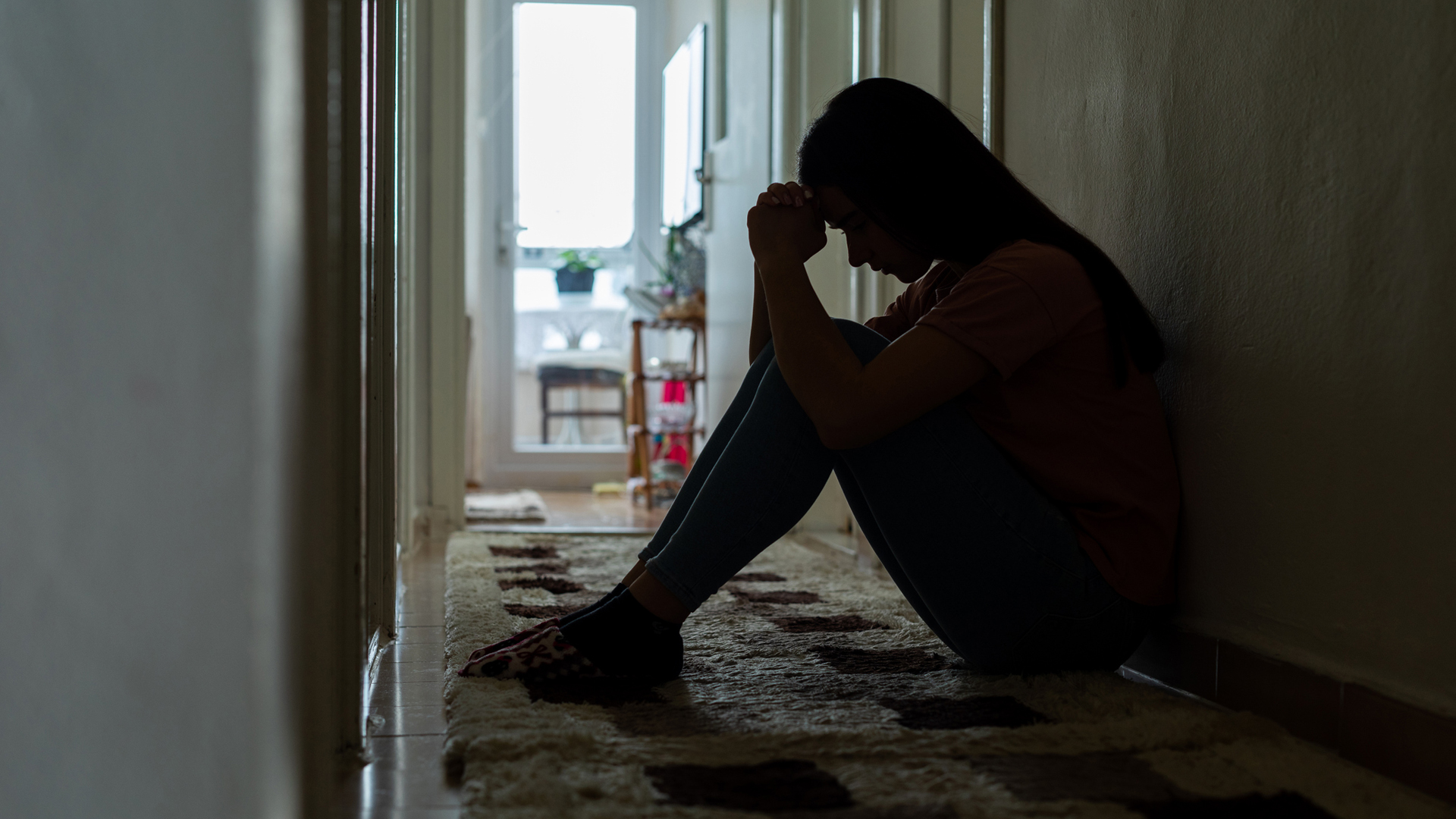Panic disorder: Causes & symptoms of panic attacks
Panic disorder is marked by sudden episodes of intense fear, known as panic attacks, that can trigger physical symptoms.

Panic disorder is a mental health condition that causes sudden and repeated bouts of extreme fear that can last for several minutes or even longer. These episodes are referred to as panic attacks. The attacks are characterized by heightened feelings of disaster or of losing control, even when there is no immediate threat.
At first, the fear can be limited to a specific circumstance, such as getting in an elevator or driving over a bridge. That can lead to situational avoidance, according to the American Psychological Association (APA). As the disorder progresses, the person begins to fear not just the situation, but also the possibility of having an attack, and retreats from many daily activities.
There is a link between panic attacks and agoraphobia. People who suffer from agoraphobia typically avoid public places, such as public transportation or shopping malls, where they feel they may be trapped, according to the Anxiety and Depression Association of America (ADAA). About one in three people with panic disorder also develop agoraphobia.
Dr. Deborah Lee, a medical writer for Dr Fox Online Pharmacy in England, told Live Science that it can be hard to identify the trigger of a panic attack. "Panic attacks appear quite suddenly, often for no obvious reason," she said. "The sufferer feels acutely anxious, fearful, trembling, sweaty and may have palpitations. When a panic disorder is present, panic attacks occur frequently, sometimes several times a week."
People with panic disorder fear having another attack and often avoid situations and places in which previous attacks have occurred, according to the ADAA. As the attacks become more frequent, a sufferer's world gets smaller and smaller and they stick to very specific areas and routes where they feel safe.
According to the National Institute of Mental Health (NIMH), about 2.7% of adult Americans have suffered from varying degrees of panic disorder. Women are more than twice as likely to suffer than men too (3.8% compared with 1.6%). While it can occur at any age, panic disorder commonly begins during late adolescence and early adulthood.
What causes panic disorder?
While researchers have not determined a specific cause of panic disorder, many doctors believe it is a combination of environmental and genetic factors, according to the NIMH.
Get the world’s most fascinating discoveries delivered straight to your inbox.
"Panic disorder is a mental health condition, the cause of which is not well understood," Lee said. "It can occur in association with medical conditions such as an overactive thyroid gland, anemia, poorly controlled diabetes or heart disease."

Having worked for many years in the National Health Service in England, initially as a general practitioner, and then as lead clinician for an integrated community sexual health service, Dr. Deborah Lee now works as a health and medical writer for Dr Fox Online Pharmacy
Studies with twins have demonstrated that a genetic inheritance of the disorder is possible, according to the APA. Brain abnormalities can also contribute to the condition, with a review in the journal Psychiatry and Clinical Neurosciences finding that the amygdala region of the brain was smaller in those with panic disorder compared with control subjects. Those with panic disorder experience excessive stimulation in the amygdala, which is involved in the fight-or-flight response, and is responsible for fear and aggression, as seen in an article in the journal Psychiatric Clinics of North America.
Unbalanced neurotransmitter systems can be a cause of panic disorder, said Dr. Christopher La Tourette La Riche, medical director of the Lucida Treatment Center in Lantana, Florida.
Chemical or hormonal imbalances can also be a cause of panic attacks, according to an article in Psychiatric Clinics of North America, which linked the neuroendocrine (hormone production) and neurotransmitter systems with panic disorder.
In addition to biological factors, researchers are also investigating how stress and environmental factors may play a role. A major stressful life event, such as giving birth, divorce, accident or the death of someone close, can trigger a panic attack in someone who previously exhibited no signs of the disorder, as can be seen in a study of postnatal panic disorder in the journal Comprehensive Psychiatry. However, the majority of those who suffer from panic disorder cannot pinpoint a specific event that triggered the condition.
"Most people I treat have experienced some form of trauma at a young age — abuse, neglect, etc.," La Riche told Live Science. "These episodes are known to cause chronic changes in the brain and predispose adults to anxiety disorders."

Birnbaum is an attending physician in the Department of Psychiatry at Zucker Hillside Hospital in New York City. He works as the program director for Northwell Health's Early Treatment Program (ETP), a clinical and research initiative for adolescents and young adults in the early stages of psychosis. Birnbaum received his bachelors in psychology, followed by his medical degree, from McGill University in Montreal, Quebec.
What are the symptoms of panic disorder?
A panic disorder is a psychiatric condition characterized by repeated and sudden attacks of intense fear and anxiety that last for at least several minutes or more, according to Dr. Michael Birnbaum, an attending physician in the Department of Psychiatry at Zucker Hillside Hospital in New York City. While a panic attack usually lasts less than 10 minutes, according to the Mayo Clinic, the effects can linger long after the initial episode.
"Panic attacks can happen at any time, and many people with panic disorder often worry about the possibility of having another attack," Birnbaum said.
Many people who suffer from panic disorder use similar phrases when describing an incident: It feels as if you are out of control and having a heart attack. According to Birnbaum, some typical symptoms include:
- Pounding or racing heart
- Trouble breathing
- Sweating
- Trembling or shaking
- Concern that one is about to die
- Fear of losing control or going insane
Other physical signs include dizziness, numbness or tingling in the hands or other extremities, a feeling of being hot or a cold chill, tingly or numb hands, and stomach pain, according to the ADAA.
While some people can identify their triggers for a panic attack, the episodes often come on suddenly. One of the biggest sources of panic is the fear of having another attack, according to the Mayo Clinic.
Can you treat panic disorder?
While some people with very limited triggers can avoid certain situations and thus limit their panic attacks, the condition can seriously disable those who suffer frequent, full-fledged attacks, according to the ADAA.
As with most mental health issues, panic disorder is treated by psychotherapy, medication or a combination of both, depending on the severity of the condition and the response of the individual to treatment, according to the NIMH.
"Panic disorder is best treated with a combination of medications and therapy," Birnbaum said.
Cognitive behavioral therapy (CBT) helps teach different ways of thinking, behaving and responding to situations in order to feel less anxious and fearful. "Cognitive behavioral therapy is used frequently and helps to change destructive thinking patterns. And relaxation techniques are also incorporated into appropriate situations," La Riche said.

Anti-anxiety drugs and antidepressants are commonly prescribed to ease panic disorders. Medicines called beta-blockers are sometimes used to address the physical symptoms, such as a fast heart rate and chest pains, that often accompany panic disorder. "Medications help decrease anxious feelings and thoughts as well as the frequency and intensity of panic attacks," Birnbaum said.
Beta blockers can also help control the dizziness, heart pounding and excessive sweating that result from panic attacks, the NIMH said. Research in the Pharmacology of Stress indicates that beta blockers are particularly effective in treating the somatic (physical) symptoms of anxiety. The Food and Drug Administration considers using beta blockers for anxiety disorders as an off-label use, as they are approved in the treatment of heart and circulatory conditions, according to the Mayo Clinic.
Additional resources
Kim Ann Zimmermann is a contributor to Live Science and sister site Space.com, writing mainly evergreen reference articles that provide background on myriad scientific topics, from astronauts to climate, and from culture to medicine. Her work can also be found in Business News Daily and KM World. She holds a bachelor’s degree in communications from Glassboro State College (now known as Rowan University) in New Jersey.
- Lou MudgeHealth Writer


